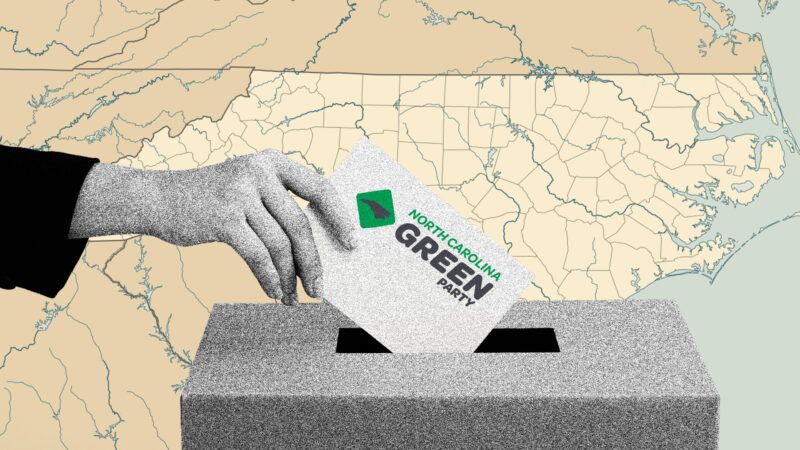North Carolina Green Party Scores Major Win in Ballot Access Dispute
The State Board of Elections has allowed the Green Party to register as an official political party amid a signature validity dispute plaguing its House and Senate candidates.

The North Carolina State Board of Elections (NCSBE) voted unanimously on Monday to recognize the North Carolina Green Party (NCGP) as an official registered political party in the state. The decision marks another twist in what the North Carolina Green Party claims is a concerted effort by North Carolina Democrats to prevent Green candidates from appearing on the November 2022 midterms ballot.
Under North Carolina law, parties must obtain 13,865 real signatures from registered voters, including at least 200 signatures from at least three different congressional districts, to be recognized by the NCSBE, which is a panel of five election administrators and an executive director chosen by the governor. Individual candidates can also submit signatures in order to appear on the ballot, though they must collect signatures from 1.5 percent of registered voters in order to qualify. To keep ballot access, parties must win 10 percent of the vote in the state's gubernatorial and presidential elections. If not, they must reapply to regain NCSBE recognition and appear on the ballot in successive elections.
State law requires that these documents be submitted by July 1 in every election cycle so the board can review them ahead of the November ballot preparation process that takes place in August. A majority of the NCSBE's members must vote in favor of recognizing parties and candidates and certify the validity of the signatures they obtained before they can appear on the November ballot.
Back in 2018, the NCSBE officially recognized the NCGP, granting them ballot access through the 2020 presidential and gubernatorial elections. During this time, the NCGP ran several candidates for local and federal office, never meeting the 10 percent requirement. Green Party presidential candidate Howie Hawkins won just 0.22 percent of the vote in North Carolina in the 2020 presidential election. As a result, the NCSBE revoked the NCGP's recognition, forcing it to reapply for ballot access ahead of the 2022 midterms, where they planned to field candidates in the U.S. Senate race and several House races.
Many states have imposed signature requirements and other access barriers to the balloting process. Reason has previously reported on how neighboring Georgia's similar ballot access laws, designed to bar communist candidates from appearing on the ballot, have stymied the emergence of third parties and the prospects of their candidates. These laws, which usually require prospective candidates to collect signatures from their local area in support of their candidacy, have raised the bar to entry for electoral politics dramatically for fledgling parties. Back in 2005, the North Carolina Libertarian Party experienced similar challenges staying on the ballot, though these issues were eventually resolved out of court.
Even when candidates achieve the requisite number of signatures, like in North Carolina, they can often find themselves mired in investigations over the validity of those signatures. The same strategy is also used within political parties themselves to insulate incumbents and discourage primary opponents from successfully mounting insurgent campaigns.
The Board of Elections opened an investigation in June after various county and state elections administrators claimed to find "irregularities" in the signatures collected by the North Carolina Green Party and its candidates for the November midterm ballots. These irregularities prompted the board to deny the party recognition and bar Green candidates from appearing on North Carolina ballots in November as it investigated additional claims that signatures were forged and/or duplicated. The Green Party responded with a lawsuit accusing the Board of denying Green Party voters their rights to "cast their votes effectively, to speak and associate for political purposes, to grow and develop their political party, to petition, and of their right to due process, as guaranteed by the First and Fourteenth Amendments." A federal judge is expected to rule on the matter in the coming days.
"NCSBE has never produced evidence of any 'irregularities' in NCGP's petitions to NCGP, nor has it provided NCGP with any opportunity to defend the validity of the signatures on its petitions or the integrity of its petitioning process," the Green Party argued in a July 22 court filing. They argue that the Board's slim Democratic majority bolsters the Democrats' nominee for U.S. Senate, Cheri Beasley, a former chief judge of the North Carolina Supreme Court who Democrats see as one of their best hopes for expanding their slim Senate majority.
North Carolina's Senate seat is one of the more competitive Senate seats up for grabs in the 2022 midterms. Incumbent Senator Richard Burr (R–N.C.) pledged not to run for reelection, opening the door to a contentious Republican primary. Ultimately, Republicans nominated Rep. Ted Budd (R–N.C.), who former President Donald Trump endorsed. A FiveThirtyEight polling average shows that the race is tight, with Budd barely outperforming Beasley in most polls.
Green Party officials called into question the origins of the complaints, which they have tied to Democratic field organizers in the state and staffers employed by North Carolina Governor Roy Cooper, a Democrat. They also raised alarm bells after the Elias Legal Group, a group of activist lawyers that has supported Democratic candidates in election law disputes, began backing the Board of Elections decision and representing Democratic activists who allegedly harassed Green Party members and candidates.
Despite the recognition decision, the Board of Elections has said little about its next steps. "Because the deadline in state law for submission of new political party nominees has already passed, it is unclear whether Green Party candidates will appear on the November 8 general election ballot," the board said in an August 1st statement. Instead, the Board seems content to wait out the judge's ruling and act from there.
"Ballot preparation begins in mid-August, so there still is time to add Green Party candidates to the ballot if the court extends the statutory deadline."


Show Comments (25)